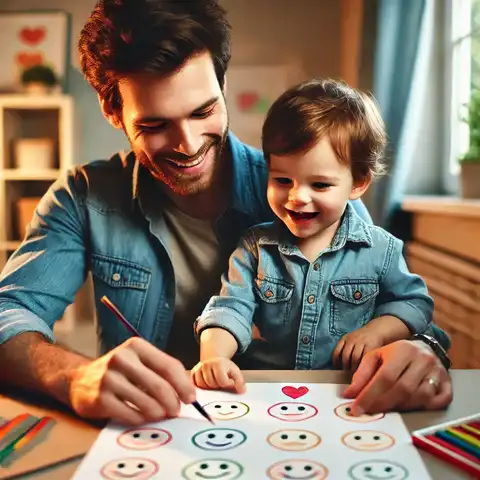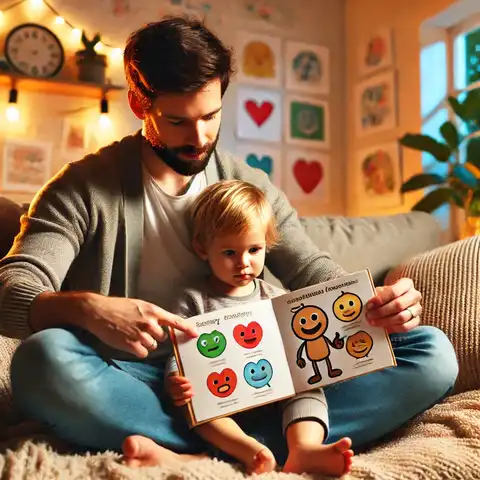Raising emotionally intelligent children: Emotional intelligence is the ability to perceive your emotions and those of others. Children Need To Learn Emotional Intelligence Kids use it to make friends, improve school, and feel happier. Here’s why children should learn it and how parents can help.
What is Emotional Intelligence in Children?
EQ (emotional quotient) refers to emotional intelligence, which means being able to identify, process, and regulate one’s emotions. Being emotionally intelligent means kids can Identify their feelings.
Why is Emotional Intelligence Important for Children?

Responsibility: Developing your child’s Emotional intelligence/ EQEQ is crucial for children. It helps them understand their feelings and those of other people. The reason why curbing their EQ might feel important for a child is this:
- Heightened Social Skills: Those with high EQ are likelier to have friends and get along well with others. They are good at listening and interpreting emotions well.
- Calming the wild wind: High-EQ children are able to cope with their emotions appropriately. They know how to respond when they are angry, sad, or scared. They may, for instance, take deep breaths or speak about their feelings instead of having a tantrum.
- Enhanced Problem-Solving: As children understand their emotions, they become better problem-solvers. When they disagree with one of their friends, kids can apply those emotional management skills to express what upset them and how it made them feel and work out behind the scenes why arguing is not an inevitable outcome.
- Academic Performance: Children who are more emotionally intelligent perform better in school. They perform at their best, concentrate better, and don’t anger quickly when they are capable of controlling themselves. This helps prevent them from giving up their efforts, even when the homework is too complicated on the school campus.
- Resilience: High EQ kids are more resilient. They are not horrified by the possibility of things not going their way, as if losing a game or getting an A on a test impacts anything other than that particular moment.
- Man: Emotionally intelligent kids = More positive relationships as they age. They can express their feelings and know about the feelings of others.
- Improved Mental Health: High-EQ Children often have improved mental health. They learn to cope with stress and communicate their emotions before bottling them up.
- Greater Empathy: By becoming experienced at recognising what is being felt, children become better able to appreciate the emotions of others. This explains how they can sense the emotions of others and behave nicely. They must help others when sad and celebrate with them in joy.
- Improved Conduct: High-EQ children carry themselves well. The best part about these golden babies is that they get others and realise everything isn’t a game… so they’ll likely be rule followers and play nice.
- Future Readiness: By teaching your children emotional intelligence, you prepare them for their life ahead. They could come into it with the challenge of growing up. This will help them create their destiny in life and ensure a meaningful and happy adult phase.
Teaching Children to Recognize and Express Their Feelings

Here are some ways:
- Teach Kids Words for Feelings: Call a Feeling Something (happy, sad, mad or scared). This allows them to express their feelings.
- Keep Emotions In Conversation: Ask your kids to share how they feel every day. It should become a common part of your conversations.
- Learn Coping Skills: Demonstrate to children how they can help themselves through difficult times by taking deep breaths or counting one…two….
- Family therapists recommend Model Good Emotions: Children learn from their parents. Demonstrate the art of emotional management and healing.
- Stories/Books—Read stories in which the characters experience all kinds of emotions. This is a great way for kids to understand how emotions can be managed.
- Help with Problem Solving: Encourage your kids to brainstorm solutions when a problem arises. For example, if a child is shouted at for being upset that they lost their toy, it could be rephrased as: “What do you think we can to help cheer you up?” or “Look under your bed. I found my bracelet there.”
- Children must be taught about all emotions. Ensure that children learn about various feelings, not just happiness. Make them learn what is jealousy, disappointment, and excitement.
- Safe Space for Feelings: Ensure the home is a safe space for children to express their feelings. Reassure them that they will not be judged and that they can be open about their feelings. Allow them to feel whatever they are feeling.
- Praise Positive Behavior: When children feed help healthy, praise this behavior.
Learning to control emotions requires patience. Beep … beep!.. Include children in all purposeful work activities, e.g., putting away dishes, folding laundry, or carrying little things from one room to another as they slowly walk with intention. Be patient and understand when kids are struggling. Empathise, and let them know that it is okay to mess up.
The Role of Empathy in Emotional Intelligence

This is how empathy helps children to develop — emotionally.
- Empathy is Understanding Others. A child can experience happiness, sadness, or even anger due to the presence or absence of someone they love.
- Social skills: Aware children can easily make and maintain friends, which allows them to be more supportive and polite with their friends.
- Better Communication: Children with empathy are better at talking and listening. They will know what the other person feels and can use appropriate words to let them know that someone cares about their feelings.
- Benefit: Increasing inclusivity in practice—Children who are empathetic will act with greater kindness. They know everyone has feelings, and kindness goes a long way. Perhaps they help a fellow who is hurt, share their toys (well, maybe we can make an exception there), or stand up for another.
- Aiding in Conflict Resolution: Empathy helps children resolve conflicts better. They can problem-solve like champs. For example, they understand taking turns with the toy because of someone else’s perspective.
- Why it Reduces Bullying: Children who have empathy do not needlessly bully other children. They understand that bullying upsets people. If parents and educators teach empathy, we will prevent bullying in schools.
- Increasing Emotional Literacy: Empathy guides children to view their own emotions more accurately. By seeing the feelings of others, they feel more about their own.
- Stronger Teamwork: The first step to working effectively in a team is empathy. Our children also work well together — and support each other better, too, when they know the feelings behind their teammates.
- Future Ready: Empathy prepares us for the upcoming future, and well, we all want the best for our children, right? They will have to interact with many people and face lots of challenges.
- Promoting Emotional Development: Empathy promotes emotional growth in children. This one teaches them about emotions and learning how to express themselves properly. They become more caring and emotionally intelligent by practising empathy and seeing their self-image.
Helping Children Talk About Feelings in a Positive Way
Kids must be taught how to specify their feelings by cues. Here are some ways to help:
Give Praise: Reward your child when he or she tells you what is bothering them in a desired manner. This will have a beneficial effect on doing it more.
Encourage Communication: Establish an open line of communication so that your child feels comfortable speaking to you about how they feel. Inform them that it is okay to express all emotions.
Emotional intelligence signs in your Children
Some behaviors that are synonymous with children who have great emotional intelligence include:
Aware of What They Feel: Capable of identifying their emotions
Empathy (takes into so much more than I even know how to explain)__(You can understand others’ feelings and respond with kindness).
Dealing with Conflict Constructively: Disagreements can be resolved healthily and respectfully.
Through Emotional Intelligence, Schools Can Help Children
There are many ways schools can help kids learn about emotions;
SOCIAL-EMOTIONAL LEARNING (SEL) Many schools use Social-emotional Learning programs, or SEL.
These programs teach children how to regulate emotion, overcome the impulse to make poor choices and develop healthy relationships. Activities for SEL: Games, Group Talks & Role-plays
- Advocating for empathy and kindness: Schools can foster kindness and understanding children.
- Fostering a Safe and Supportive Environment: Schools can foster an environment where children feel comfortable talking about emotions.
How Can Parents Help Develop Emotional Intelligence in Their Children?
What to Look For: Parents Role in Enhancing Emotional Intelligence
Ways parents can assist:
- Teach Emotional Health: Share your feelings and how you manage them.
- Teach Feelings: They need words for the basic “emotion” or feeling states — happy, sad, mad and frustrated.
- Listen and validate: Tell your child you understand how he feels by saying things like, “I know this gets annoying too,” or “It’s normal for you to feel a bit upset.”
Practice Emotional Intelligence for Kids
Some activities to teach kids about emotions include:
- Role-Playing — Pretend you are in different situations and explain to your child how they should act.
- Empathy Games: Encourage your child to put themselves in other’s shoes. This teaches them what empathy is.
- Games about emotions: There are games in which children must make emotional associations to learn something simple but still very important—to identify feelings from themselves in others.
Problems Of Parenting Emotionally Intelligent Children
Emotionally intelligent kids are hard to raise! Common challenges and tips for parents include:
- Emotion Regulation: They may not have the vocabulary to identify their emotions; in other words, they don’t know what’s going on. Simple words to describe feelings parents can help children talk about how they are feeling by using simple language and doing this regularly with them.
- Emotions: Children experience intense emotions such as anger, sadness, or fear. Sometimes, it is hard for them to know what they are feeling and how to deal with it. Parents could train their kids how to calm down, e.g., by taking deep breaths or taking a ten-count measure before exploding with anger. What is critical to add—and this was the part I had forgotten (I guess teenagers might do that 😉 )—is that all feelings are okay but must come out.
- Teaching Emotional Intelligence: Parents act as role models in demonstrating emotional intelligence. It is difficult to train kids on this when the parents themselves cannot control their emotions. Parental support and coping with positive emotions.
- Many parents work and take care of house and bill payments, so they may think teaching emotional intelligence is a waste of time. But it really doesn’t have to take long to teach about emotions. Any everyday moment is an opportunity to talk about feelings—at meals or while driving, for example.
- Varying Emotional Needs: All children are different and may have diverse emotions. Some may need extra support in expressing their feelings, while a few might require additional help to calm down when irritated.
We need to raise emotionally intelligent children so that they may grow up well in the future. By giving your children tools to identify their feelings, you can empower them to become compassionate, confident, and resilient. When properly guided, all children can develop empathy and healthy relationships.


